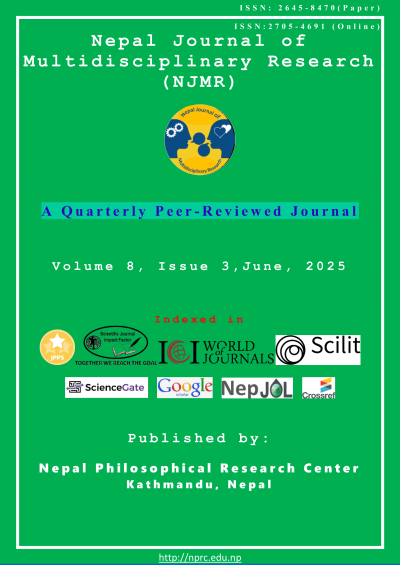Online Advocacy and Social Media’s Role in Communicating Effects of Environmental Pollution
DOI:
https://doi.org/10.3126/njmr.v8i3.77401Keywords:
New Media, Social Media, Environmental communication, Environmental Pollution, Environmental Sustainability, Online AdvocacyAbstract
Background: This study was motivated by the increasing rate environmental pollution in Nigeria, environmentally hazard behaviour, attitude and habit of citizens and the tendency for social media to help communicate the effect of pollution and facilitate environmental sustainability. Anchored on two-step flow theory, this study examines the roles of new media in communicating the effect of environmental pollution in Nigerian universities.
Methods: The study adopted survey research design and collected data using questionnaire. Students of University of Abuja and Nile University make up the study population while 398 of them were sampled. This study used the descriptive and regression analysis methods. SPSS version 27 was used for analysis.
Results: The results showed that social media platforms like Facebook, Twitter (X), and Instagram are the major channels for acquiring knowledge about environmental pollution among respondents. It revealed that students are more likely to view, like and comment on environmental related content coming from these platforms, but are less likely to share or participate in online events. The respondents displayed relatively low knowledge of the meaning, causes and effect of environmental pollution. Despite, regression results showed that students' exposure to EP-related content on social media strongly and significantly correlates with their knowledge, behaviour, and attitude toward environmental sustainability.
Conclusion: The study concludes that environmental advocates should adopt multimedia style of content creation. They should incorporate features that encourage users’ interactivity, such as polls, quizzes, and FAQs.
Novelty: The study is the first to empirically examine how social media influences EP-knowledge and behaviour of university students, who are mostly active online.
Downloads
Downloads
Published
How to Cite
Issue
Section
License
Copyright (c) 2025 The Author(s)

This work is licensed under a Creative Commons Attribution-NonCommercial 4.0 International License.
This license enables reusers to distribute, remix, adapt, and build upon the material in any medium or format for noncommercial purposes only, and only so long as attribution is given to the creator.




